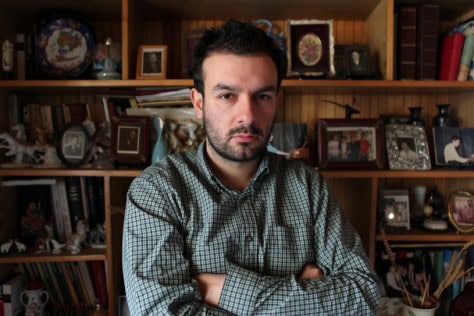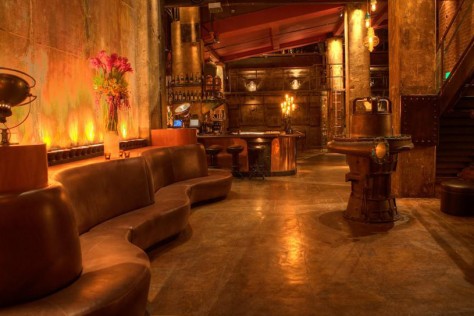Ten o'clock on a rainy Saturday night in Berlin. The sound of wet tires from cars whizzing up and down Torstrasse is all your ears afford you. The bright, luminescent glow of buses chugging late-night commuters and hobos home is all your eyes register—until you reach number 60 on this particular street, that is. Situated slap-bang in the Mitte district of Germany's still-relatively-new capital city, the throbbing red-lit sign gives little away except the name of your destination: Kaffee Burger.
Upstairs inside the restaurant, you could be almost anywhere: Paris, Moscow, Budapest, even New Orleans, but definitely not London (way too bourgeoisie for that.) In fact, forget all that—you could only be one place and that place happens to be right here, where the old swinging Berlin of the late 1920s and Russian nostalgia meets the new Berlin of now: bright-eyed, forward-thinking and certainly as uncertain as it gets. Low-lighting, quiet conversations and the clinking of glasses set a sleazy, sophisticatedly European tone.
And then, straight out of nowhere, it hits you like a great, fat crimson fist in the ribs. A bulbous, brass-driven bass line pounding through the floorboards from the sound system downstairs, a couple of stray violin notes breezing their way up the stairs, hand in hand with amorous accordion ripples and an uproar of joy, high times and adventure from the heaving masses filling every corner of the main room, the queue snaking back for miles.
Welcome to Russia, Berlin-style. Welcome to Russen Disko.
Almost seventeen years after German re-unification, following the fall of the wall in November 1989 and the subsequent exodus of many Soviet guards who once patrolled the city's wall perimeters and various checkpoints, Russen Disko (literally translated as “Russian Disco”) represents the rapidly changing tempo of today's Berlin. So much so, in fact, that a growing influx of curious next-generation Russians and immigrants from all over are flocking back to the Deutsche capital in search of that certain something in this hotbed of cultural diversity that was once known to the outside world as the grey, oppressive Eastern Bloc. Russen Disko is the by-product of two of that region’s more prolific CCCP ex-pats: DJ/musicologist, Yuriy Gurzhy (Ukraine) and journalist/novelist, Wladimir Kaminer (Russia). This bi-weekly melting pot of alternative arts from the ex-Soviet Union has reached boiling point.
“Essentially, it's all about celebrating the music from our homeland,” says Gurzhy as he dips out of the chaos around his DJ booth downstairs for a necessary visit to the bar. “No matter what it is or where it's from, it has to be what we both dig.”
Now in its eighth year of existence, and established globally through a tight network of likeminded artistic instigators, from Vladivostock and Kiev to Tel Aviv, the Balkans, Brighton Beach and beyond, Russen Disko has made giant musical and cultural steps forward. Metaphorically: East meets West, gets it on, falls in love and the goes on to produce a plethora of beautiful babies together that, ultimately, defy categorization. Russian roots and history form the basic influence—add the rest of the world into the mix and what you end up with is the ethos of Gurzhy and Kaminer’s Russen Disko.
It wasn't always this easy, and no way near as certain. Gurzhy arrived in Berlin in 1999, when Kaminer had already been living in the city for over five years. The two crossed paths at a gig for one of the psychedelic art house bands Gurzhy was playing in at the time. “Wladimir was invited to film it, basically because he was the only one with a video camera,” he laughs. “The next day we went to his place to check out the video and I ended up borrowing some cassettes from him. It was a major moment for us both, absolutely. We became close friends; meeting up, exchanging music and ideas, and then at some point his wife, Olga, asked us if we could make something more constructive out of it apart from just sitting in the kitchen, smoking and drinking too much and listening to those damn tapes for hours.” Needless to say, they heeded Olga's worldly advice and, somewhat by chance, coincidence and fate, set plans for the big adventure.
Five years later, connected to every key player in post-Wall, late nineties Berlin, Kaminer was approached by a guy intent on putting together a party celebrating the anniversary of the Red October Revolution. They talked, Kaminer then banged heads together with Gurzhy, and it was on.
“We just did it for the fun of it: having completely no idea of what it would be like, what sort of people would come, if any, so we were like, 'Fuck it, let's just do this!” Gurzhy says. “All we had was two CD players and twenty discs of stuff we thought was danceable. The whole point was to use music from the ex-Soviet Union, no matter what, just stuff we liked. Anything. That was it. Three or four hundred people later and it was absolutely insane. The best night.”
It just so happened that the future-owners of Kaffee Burger were there that evening, soaking up the experience. Seizing the moment, they asked Gurzhy and Kaminer if they fancied doing something similar at the venue they were opening on Torstrasse about a month later, and, well…you can pretty much pre-empt the rest…
Back in 'Burger on a Saturday night in January 2007, the lunacy continues. Girls, boys, men and women serenade both themselves and each other on the dance floor to a clear, heady brew of music not heard outside of these burgundy, GDR-wallpapered confines yet. Rambunctious soundtracks comprising choice Moscow ska, St. Petersburg punk, Romanian reggaeton, American klezmer (in all its illustrious guises) and even a little slice of 60s Kingston, Jamaica, are all thrown in for good measure.
Orange lanterns above the packed bar and choice Communist ephemera peppered around the glass display cases are the only things standing still as Gurzhy drops Nayekhovichi's tearing rendition of “Paint It Black”, followed swiftly with Madness' “Nightboat To Cairo”, courtesy of King Django. If 'Burger's roof could lift off, landing somewhere far away and remote, it surely would. Sensing the heat, Gurzhy promptly removes his Fedora before studying his CD collection and planning the next move.
Far from over, a steady slew of revelers, be they Berliners, Spanish, French, American, Italian, English or African, continue to pad out the already-dripping walls, their bodies eager to move under the soft red lights of Russen Disko. Such is its reputation nowadays that people will literally head to Berlin from wherever they happen to be, just to get a first-hand look at the experience—but try finding any Russian faces besides Gurzhy and Kaminer's, and you'd be hard pushed to come back with much.
“Immigrant-wise, there is a big Russian population here in Berlin now, but we're not really connected to [the] community, and I'm very happy about that,” Gurzhy explains. “I mean, community has its own rules, its own scene and its own parties—if you can call them that. We're playing [the] kind of music [the] Russian community doesn't dig. They're into the cheap pop stuff, so in the beginning of Russen Disko, some Russian people were coming, but they were not really even curious about what we were doing in the first place. I remember them saying, 'Hey, there's too many Germans here, where are all the Russians?’ I mean, what the fuck is that about?”
With or without their fellow countrymen and women, Gurzhy and Kaminer are continuing to push the boundaries in their chosen fields, whatever it takes. While both travel, together and individually, to regularly DJ abroad, Kaminer’s acclaimed novels have earned him literary renown near and far. Gurzhy’s rock band, Rotfront, and his Shtetl Superstars alter-ego continue to build on their success, and a host of Russen Disko-related compilations and high-humor shows on Radio MultiKulti 96.3 FM in Berlin reach the ears and minds of listeners the world over. Meanwhile, the club is expanding to concurrently run related events at Club Rodina, just up the road, where themes are set to encompass Bollywood, Turkish and Egyptian Punk, and bare-fist-fight dance choreography. All in a day's work, obviously.
“The thing is, we love it here in Berlin,” says Gurzhy. It’s now 5:30 a.m., and what was night turns over into a long morning at the bar. “We've everything we need: friends, family and everyone connected with what we do as Russen Disko. We'd be crazy to leave just yet. Also, the city is changing all the time, which is a good thing. You never quite know what to expect.”
With that, he buttons up his jacket, dons the Fedora again, shakes hands and slopes off into the wet street outside, his figure becoming an illuminated-red shadow against the light of dawn. We'll be seeing him again…
 Q&A with Larry Gus
Q&A with Larry Gus We Own the Night: The Edison
We Own the Night: The Edison
No Comments